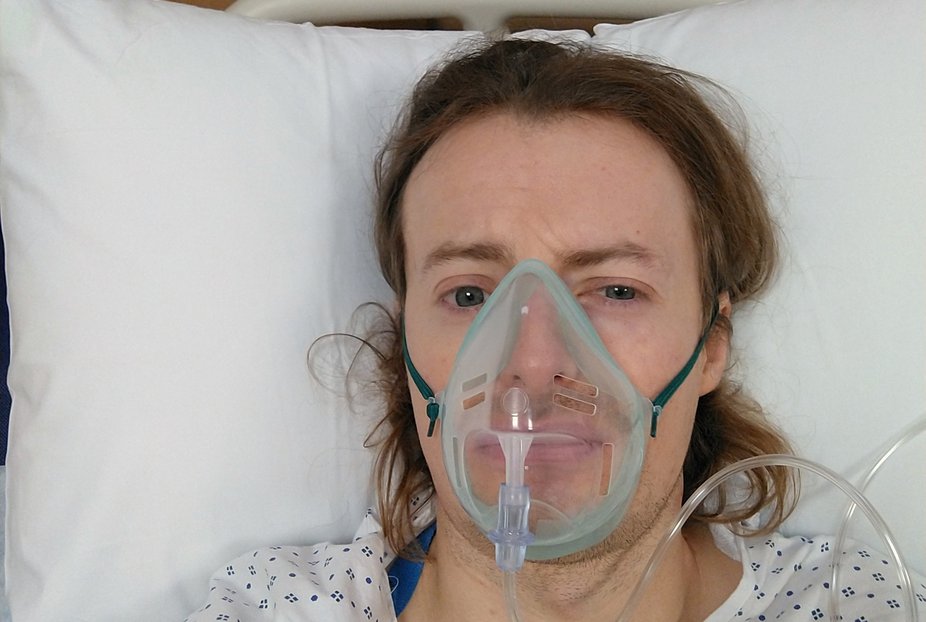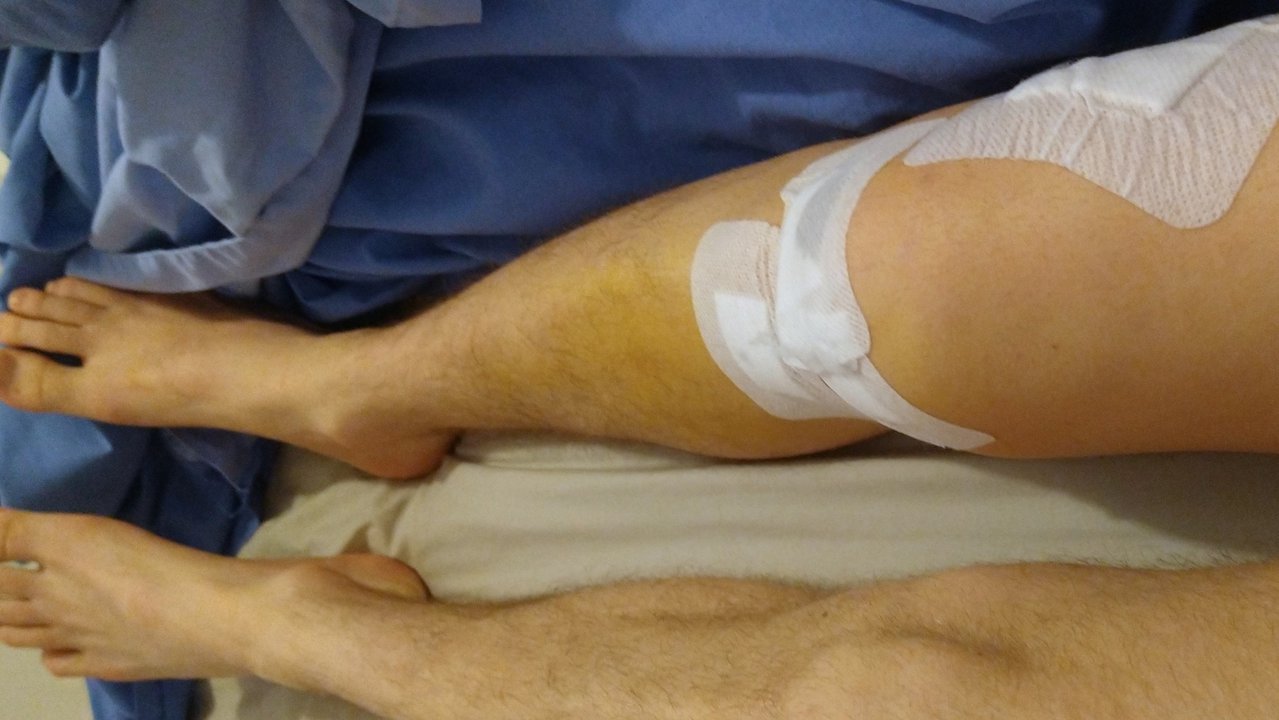Surgery Day
Part two of my ACL diary begins with the surgery itself. I had a very talented and uncharacteristically caring surgeon in Dr Jonathan Bell at Wimbledon Clinics. No offense to their talent, but many surgeons do not come across as interested in anything but cutting you open and sewing you back together. He’s a skier himself and has repaired ACLs for many high-level skiers in the past, which gave me a lot of confidence. We had already agreed to go for the hamstring tendon as my graft (see ACL Diaries part 1) and while he was fixing the knee, he would also investigate potential meniscus damage. As it turned out, he did have to do some minor meniscus work, but otherwise, the knee was in good shape (except for the torn ACL, obviously). I woke up pretty groggy, but thanks to the nerve blocker put in by the anesthetist, the pain wasn’t too bad. I went under the knife at about 2 pm and I was ready to leave the hospital by 7.30 pm. Not bad going for a fairly major operation.
I also saw a physiotherapist on the day of the operation, who gave me exercises to start as soon as I got home. This brings me to my first major pro-tip:
- If you can get a nerve blocker, do it. Pay for it if it’s extra. Having it will not only reduce your pain but also help you get your range of movement back way more quickly post-op. I found it doable to more or less fully extend my leg with the blocker in and as it wore off, I lost a little ROM thanks to pain. I would certainly be in a worse situation now if I hadn’t made sure to do some very early movement with the nerve blocker still minimizing the pain.
- The same goes for doing your physio immediately. I think I have those first couple of rounds of doing the exercises, the first of which I did at about 10pm on surgery day, to thank for my good post-op situation.
Immediately after the operation, I could crutch around and bear weight on the injured leg. It became a little harder to move in the following days, but I would estimate that I had about 100 degrees of flexion and close to full extension within a few days of surgery.

I have no recollection of taking this, but it's the only picture I have, so in it goes
_
The mental struggle (Pt.2)
However, my headspace post-op was even worse than after the injury. I was back to lying in bed all day, back to the pain, sleeping badly and while it helped with the pain, I think the tramadol was making things worse on that front too. I was certainly feeling dozy/sick during the daytime the first few days. I can’t claim that my mental health was particularly stellar going into the operation, or indeed for the year or so beforehand. But anxiety hit me like a train 24 hours out of surgery and by 48, I was as bad as I’ve ever been.
I’m not a naturally positive or widely social person at the best of times, but a cocktail of skiing, other outdoor activities, and my few close relationships is generally what keeps me grounded. It’s worth mentioning here that in order to have the operation, I return to the UK from Switzerland, leaving my life, home, friends, and partner behind. I’m sure that didn’t help the process. In my head, their lives continued and I felt, rightly or wrongly, instantly forgotten.
I’m also a generally goal-oriented person and who is very poor at doing nothing. Pre-injury I almost never watched TV, played games, or listened to music when alone, basically seeing things like that as a waste of time. The only thing I really watched was, you guessed it, skiing. Essentially, I had perfect storm conditions for a mental shitshow and so it proved. I made some pretty sizeable mistakes in terms of how I reacted, mentally, to surgery and I regret them and their after-effects now.
As skiers go, I think my traits are fairly normal. To get to where we are, we’re often obsessive to the point of using our sport as a crutch. I’ve actually had some great advice from people who’ve been through it before that I’m at least trying to listen to. Post-operation I’ve been in the process of trying to find anything to distract myself, at least until physio can start properly. I’ve read a couple of books and kept on working but I can't say I've found a great way to fill the time.
Most important is to try to accept what you feel and try to focus on the day to day, not to think about the future stretching out in front of you... because a year of feeling like this seems frankly impossible, even though I know so many people who have been through the same and far worse. I can’t say I’ve actually achieved any kind of resolution here. I certainly can’t claim the early recovery has been fun for anyone around me, but I’m discussing it because if anyone reading this is feeling the same, it's normal.
_
The first three weeks
There were 7 days between surgery and my first proper physiotherapy appointment, most of which I spent in bed, keeping the leg elevated. I had some limited exercises to get on with, heel slides for flexion, straight leg raises for extension, as well as resting the ankle on a rolled-up towel to try and gain extension, being the most important. After seeing my physio, James Vickers, another keen skier and expert in kneehab (highly recommended for anyone in the UK reading this), we added some open-chain knee extensions to that list for ten more days of initial low-level rehab before the real physio program got started. The open-chain exercise is a bit controversial with some people advising against it, but both James and Dr Bell were very much pro, as it is great for getting the quads firing again. My results have been good.
I stuck to my program very carefully and rested/elevated most of the rest of the day, which seems to have worked. If you are reading this and you're naturally a bit contrary (as I naturally I am), don’t be. Do exactly what you are told, the experts see 1000s of ACL tears and they know what they are doing.
I’m now three weeks post-op and I can more or less walk without the crutch, though for longer distances I will keep using a single crutch to prevent limping and the associated complications. I’ve lost a good amount of muscle mass in the injured leg, mostly from my quads and I can certainly feel the weakness of the hamstring in the area from which the graft was taken. That is something that can be easily dealt with over the coming months, however. Both Dr Bell, who I saw today, and the physio are happy with how my knee is looking. The wounds have healed nicely, the graft feels solid and the swelling is mostly gone. My next goal is to get back to walking normally and to make sure all my muscles are firing properly within the next three weeks.
To that end, 'real' physio work got started on two and a half weeks post-op. I'm now on a static bike daily ((Aka Tanner Hall-ing) I can easily do full rotations but apparently some people start with partial) with squats, prone hamstring curls and several more exercises added to the torture menu. I am definitely not the kind of person who enjoys training or going to the gym, but I do love skiing so I will be diligent with it. For anyone out there reading this and going through the same, feel free to hit me up. It’s not a fun process at all, but I’ve had a lot of great advice from very experienced people. I’ve also completely failed to remember to take photos, as always. I’ve tried to cover as much as possible here, but if you have questions, ask away! And please drop your own experiences in the comments, for me and for anyone else reading this.


Comments